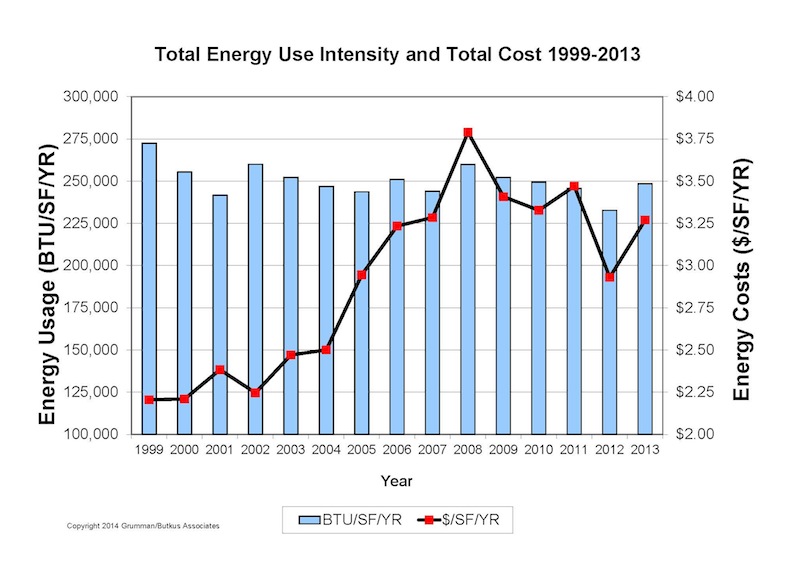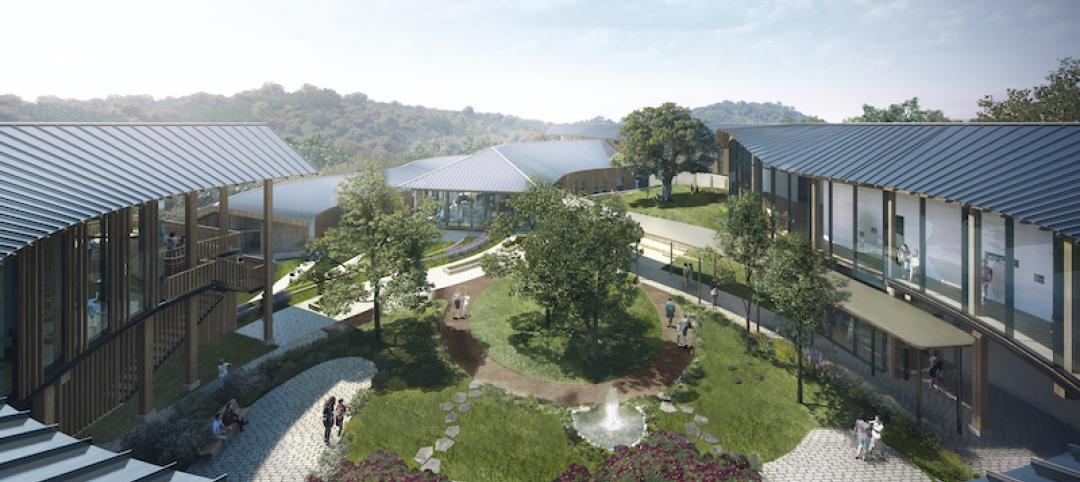Grumman/Butkus Associates (G/BA), a firm of energy efficiency consultants and sustainable design engineers, has released the results of its 2014 Hospital Energy and Water Benchmarking Survey, focusing on healthcare facilities’ resource usage trends and costs for calendar year 2013.
Since the survey was initiated 20 years ago, hospitals’ overall fossil fuel use has trended downward, but electricity use isn’t declining much. The average combined Btu/ft2 for facilities in the survey (electricity plus gas/steam) was 248,456, at a cost of $3.27/sf, compared with 235,731 Btu/sf and $3.09/sf in the 2013 survey (2012 data). Harsh Midwestern winter weather patterns undoubtedly had an adverse effect on energy consumption for hospitals participating in the 2014 survey.
Carbon footprint results have stayed fairly steady over time, at about 60 pounds of CO2 equivalent per sf per year. Water use is gradually declining, currently averaging just over 50 gallons per square foot per year (compared with nearly 70 gallons/sf/year a decade ago).
 Hospitals’ energy costs per square foot (red boxes) have fluctuated greatly since 1999. Energy use intensity (Btu/sf/year) has drifted slightly downward but rose fairly sharply in 2013, probably due to inclement weather. ©2014 Grumman/Butkus Associates.
Hospitals’ energy costs per square foot (red boxes) have fluctuated greatly since 1999. Energy use intensity (Btu/sf/year) has drifted slightly downward but rose fairly sharply in 2013, probably due to inclement weather. ©2014 Grumman/Butkus Associates.
“Hospitals are under tremendous pressure to reduce operating costs,” says G/BA Chairman Daniel L. Doyle. “Reducing energy and water usage not only helps hospitals cut operating costs, but also helps them reduce the environmental impact of their operations.”
The survey has provided a free annual benchmarking resource since its initial release in 1995. Hospitals are invited to participate without charge by submitting responses to a short list of questions. Information for this edition, covering calendar year 2013, was provided by 102 hospitals located in Illinois (54), Wisconsin (29), Michigan (7), Minnesota (4), Indiana (3), and several other states.
“Hospitals have been investing in efficiency measures and making progress, but have much further to go," says Doyle “Electrical energy reduction measures such as lighting retrofits are being offset by the introduction of more and more electronic imaging equipment and fully digital recordkeeping. Though some of the low-hanging fruit is gone, there are still many cost-effective opportunities remaining for reducing energy usage and costs. The downward trend in water usage reflects a movement to eliminate city-water-cooled equipment, as well as the use of low-flow and occupancy-based plumbing fixtures. Again, there is still much room for improvement.”
Full results and analysis, as well as information about participating in the 2015 survey, are available at the firm’s website: http://grummanbutkus.com/why-we-excel/hospital-energy-water-survey. For additional information, contact Doyle (ddoyle@grummanbutkus.com) or Julie Higginbotham (jhigginbotham@grummanbutkus.com).
Related Stories
Healthcare Facilities | Jan 9, 2021
As mental healthcare is destigmatized, demand for treatment centers is rising
NBBJ is among the firms tapping into this trend.
Giants 400 | Dec 16, 2020
Download a PDF of all 2020 Giants 400 Rankings
This 70-page PDF features AEC firm rankings across 51 building sectors, disciplines, and specialty services.
Healthcare Facilities | Dec 10, 2020
The Weekly show: The future of medical office buildings, and virtual internship programs
This week on The Weekly show, BD+C editors spoke with leaders from SMRT Architects and Engineers and Stantec about the future of medical office buildings, and virtual internship programs
Healthcare Facilities | Dec 4, 2020
What hospitals can learn from research labs
5 infection control principles used in high-containment facilities.
Giants 400 | Dec 3, 2020
2020 Science & Technology Facilities Giants: Top architecture, engineering, and construction firms in the S+T sector
HDR, Jacobs, and Turner head BD+C's rankings of the nation's largest science and technology (S+T) facilities sector architecture, engineering, and construction firms, as reported in the 2020 Giants 400 Report.
Giants 400 | Dec 3, 2020
2020 Healthcare Sector Giants: Top architecture, engineering, and construction firms in the U.S. healthcare facilities sector
HDR, Jacobs, and Turner top BD+C's rankings of the nation's largest healthcare facilities sector architecture, engineering, and construction firms, as reported in the 2020 Giants 400 Report.
Healthcare Facilities | Nov 23, 2020
HOK designs new cancer pavilion for Rutgers Cancer Institute of New Jersey
The project will be New Jersey’s first comprehensive cancer center.
AEC Tech | Nov 12, 2020
The Weekly show: Nvidia's Omniverse, AI for construction scheduling, COVID-19 signage
BD+C editors speak with experts from ALICE Technologies, Build Group, Hastings Architecture, Nvidia, and Woods Bagot on the November 12 episode of "The Weekly." The episode is available for viewing on demand.
Smart Buildings | Oct 26, 2020
World’s first smart building assessment and rating program released
The SPIRE Smart Building Program will help building owners and operators make better investment decisions, improve tenant satisfaction, and increase asset value.
Building Team Awards | Oct 22, 2020
Judging a book by its cover
The New York Presbyterian David H. Koch Center wins a Silver Award in BD+C’s 2020 Building Team Awards.

















